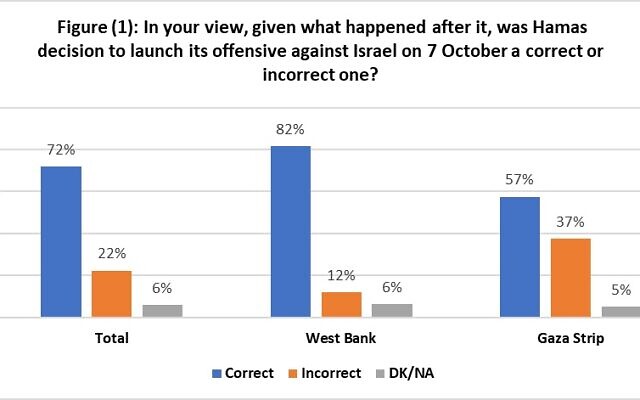
by Lev Tsitrin
Logic is clearly not New York Times‘ strong suit. On the one hand, it commiserates with Palestinians, making big deal out of the 20,000 death toll, and of their miserable living conditions. On the other hand, it tells us, in “Skepticism Grows Over Israel’s Ability to Dismantle Hamas” that “Hamas is organic to Gaza — it grew out of frustration with the mainstream factions abandoning the armed struggle against the Israeli occupation [i.e., Israel’s existence since] Hamas refuses to recognize Israel, and according to its founding charter, is committed to its destruction.”
By flipping at will the two clearly synonyms (if not identical) terms, “Palestinians” and “Hamas,” the New York Times injects the sense of profound futility of the war on Hamas into its report. Since “Palestinians” are untouchable, “Hamas” becomes invincible — as confirmed by all whom the report cites: from Hamas (“We are not worried about the future of [Hamas in] the Gaza Strip,” [“Osama Hamdan, the organization’s representative in Lebanon”] recently told a crowded news conference in his offices in Beirut’s southern suburbs. “The decision maker is the Palestinian people alone”); from some Western leaders (President Emmanuel Macron of France said this month, “The total destruction of Hamas? Does anybody think that’s possible? If it’s that, the war will last 10 years”); from pundits (like Tahani Mustafa, senior Palestine analyst at the International Crisis Group think tank: “To assume that you can simply uproot an organization like that is fantasy”); from CIA analysts (Marc Polymeropoulos, a retired C.I.A. officer who specialized in Middle East counterterrorism: “You cannot just have a strategy of killing everybody.”)
They have a point — but only because of what they don’t say: Palestinians and Hamas are largely one and the same. “A recent poll by the Palestinian Center for Policy and Survey Research found that most respondents endorsed the Hamas attack on Israel” — so to a great extent, Hamas is Gaza and Gaza is Hamas, proving the politicians and experts right.
But if Hamas is indissoluble from Palestinians, it being a vehicle for Palestinians’ inherent and perennial hope for the destruction of Israel, a question arises — why feel sorry for the Palestinians? And why place hopes in a “two-state solution” if, to the Palestinians, “abandoning the armed struggle against Israel” (“Israel” being to them identical with “occupation”) is “frustrating” and impermissible? And why hold Israel’s hands?
“You cannot just have a strategy of killing everybody”? It depends on who is counted in “everybody.” Hamas has “a force estimated at 25,000 to 40,000.” Can’t those be killed? Can’t the system of tunnels under Rafah border with Egypt that supplies Hamas with weapons and materiel be destroyed, starving Gaza of means to attack Israel? Can the underground cities that Hamas built under Gaza to launch attacks on Israel be demolished?
The answers are “yes,” “yes,” and “yes”. The New York Times is skeptical of the Israeli count of Hamas casualties (“it is unclear how the count [of 8,000 Hamas fighters killed, and 500 surrendered so far] is being made”) but indisputably, Hamasers are getting killed. While the New York Times states that Hamas is resilient, it does not make a claim that Hamasers are bomb-proof and bullet-proof. Will it take “10 years” to finish off the “25,000 to 40,000” Hamas armed forces, while preventing the new ones from emerging by blocking the flow of weapons? Maybe, but so what? It must be done, because leaving Hamas in place is simply not an option.
The bottom line is — the “ohs” and the “ahs” expressing sorrow for Gaza’s suffering and for the 20,000 casualties that takes so much acreage of newsprint at New York Times and elsewhere is hypocritical — and if uttered sincerely, is schizophrenic. The New York Times tells us — in many voices — that Palestinians are one with Hamas, that Hamas is the incarnation of Palestinian aspirations. If Palestinians are the flip side of the Hamas coin, it stands to reason that they are only getting what they deserve. Palestinians are getting hammered only because their Siamese twin Hamas gets hammered. It is natural, and by no means unfair. What’s there to be sorry about?
Needless to say, this conclusion is made by using logic — something that the New York Times refuses to do. But its readers should use logic — and should stop being sorry for the Palestinians. Based on New York Times‘ own reporting, they are not at all deserving of our sympathies.
- Like
- Digg
- Del
- Tumblr
- VKontakte
- Buffer
- Love This
- Odnoklassniki
- Meneame
- Blogger
- Amazon
- Yahoo Mail
- Gmail
- AOL
- Newsvine
- HackerNews
- Evernote
- MySpace
- Mail.ru
- Viadeo
- Line
- Comments
- Yummly
- SMS
- Viber
- Telegram
- Subscribe
- Skype
- Facebook Messenger
- Kakao
- LiveJournal
- Yammer
- Edgar
- Fintel
- Mix
- Instapaper
- Copy Link






